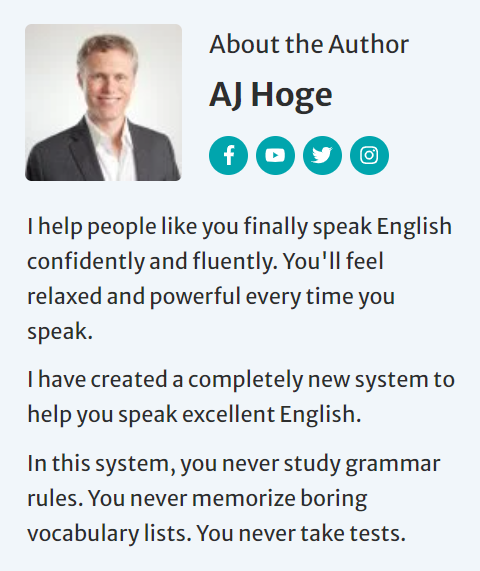You can’t speak English well. Your English pronunciation is bad so people don’t understand you. You can’t remember new words when you are speaking. When you listen to normal English audios it is difficult to understand. You feel frustrated.
So you pressure yourself. You try to speak faster. You try to listen to faster audios. You push yourself to understand faster, speak faster, read faster, write faster. This creates more stress and more frustration.
Of course you want to speak English fluently and quickly. You want to understand instantly. Perhaps most of all, you want to feel relaxed and confident every time you have a conversation. You want English speaking to feel effortless, the same as your native language.
The problem with always trying to go fast is that you can’t focus on details. When you listen to audios that are too fast, you don’t actually hear or understand many words. If you don’t hear them and don’t understand them, you will never learn them. Trying to speak too fast is also a problem. When you speak too quickly, your pronunciation often becomes even worse. You speak faster, but no one understands you. Communication gets worse, not better.
For example, I once had a Thai student who constantly focused on speed. He wanted to speak faster (be more fluent). Unfortunately, his pronunciation was bad. Even when he spoke normally, it was hard to understand him. But when he tried to speak quickly, it was impossible to understand him. His pronunciation problems became worse.
The solution to these problems is to go SLOWER, not faster. There is an idiom in English that says “slow is smooth, smooth is fast”. This means that it’s best to first practice a skill very very slowly. Concentrate. Notice all of the details. Learn and practice everything deeply. Repeat a lot. So instead of listening to faster audios, listen to slower audios. Listen carefully. Notice every word and phrase. Notice the speaker’s pronunciation. And instead of trying to speak English faster, carefully speak more slowly. Take your time and choose your words well. Make your pronunciation as clear and understandable as possible.
This works because going slowly helps you create good accurate habits. You train your brain to notice the details. You train your brain to do things correctly. With repetition, the correct skills become stronger and stronger. Eventually, everything becomes automatic. You understand automatically. You use correct vocabulary and grammar automatically. You speak with good clear pronunciation automatically.
THEN, you will automatically speed up. Your speed will increase effortlessly. You’ll find you can listen to faster audios but still understand them. You’ll find that you are speaking more quickly, but still accurately and with good pronunciation. Slow is smooth. Smooth is fast. When you reach this point, you can start to push yourself more and try to go faster. But don’t do this until you have already done a lot of slow practice.
So many of my students have followed this method. They listen again and again to fairly slow mini stories and point-of-view stories. They “shadow” my speaking. They do a lot of repetition. They learn everything deeply and totally.
And then, naturally and effortlessly, their listening and speaking get faster. They become fluent. When you listen to my VIP members speak, for example, you notice how natural their English speaking is. Smooth and fast.
When you feel stressed about your listening or speaking speed, don’t push yourself to go faster. Instead, slow down. Focus on slow practice. You will, in fact, improve much more quickly!
When you are ready, join my VIP program (below the video) and use this same relaxed method. You will speak English quickly and effortlessly.





